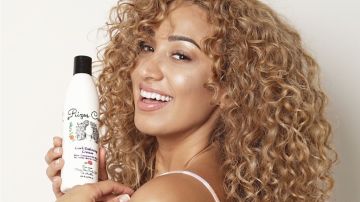This Latina’s Afro-Mexican Roots Inspired Her To Create a Curl-Care Line
Right now hair is everywhere and has become part of a national debate about race, privilege, and self-acceptance

Photo: Courtesy of Julissa Prado
Right now hair is everywhere and has become part of a national debate about race, privilege, and self-acceptance. Celebrities like Colin Kaepernick and Lupita Nyong’o have spoken out and empowered their communities by proving that curly and textured hair is political, acceptable and *gasp* beautiful. Today, the Latina curly hair movement has held up a mirror to anti-blackness and is teaching women and girls to embrace their grenas, crespos, chutas, rizos and whatever you call them. Julissa Prado is the woman on the frontlines, this year she launched Rizos Curls making it the one of the first – if not the very first – Afro-Mexican created and owned curl care lines. She’s a mogul in the making who is passionate about spreading hair knowledge to the Latino community because as she tells me, “Latinas are missing from the curly hair conversation. We talk about long-term health with everything else but not about hair. We don’t know anything about it. I want to change that.”
Prado is a proud Los Angeles native and first gen Latina whose family you’ve probably unknowingly interacted with at some point in time if you live in Los Angeles. Her cousins own Pinches Tacos, an L.A. staple with locations from Sunset to Santa Monica. And her Uncle was the owner of Cha Cha Cha in Silverlake, which closed it’s doors for good in 2016 to make way to luxury condos after 30 years in business. It’s her connection to her roots and to the L.A. Latino community that has pushed her to pursue a career dealing with the frustrations that Latinas experience with their hair. It was a need she saw growing up in her Dad’s Restaurant in Pacoima and visiting her family in Mid City. “I grew up around people who looked like me. In Mid City and Pacoima there are a lot of Central American people; they’re Guatemalan, Salvadorian, and the majority of people had some kind of curls” she explains. “Almost no one knows how to take care of [them though], which is just crazy!”
Much like the food her family serves up Rizos Curls was born out of the flavors of the Afro-Mexican and Afro-Mestizo experience, which are identities that have been historically excluded from the national Mexican identity. Veracruz, Oaxaca, and Guerrero have some of the largest Afro-Mexican populations in the country. And although the populations are relatively small – either by lack of reporting, intermixing, or by insular community practices – in 2015 (the first Mexican census to allow people to identify as Afro-Mexican) 1.38 million individuals identified as Afro-Mexicans. 64.9% of Afro-Mexicans also identified as indigenous and 9.3% of Afro-Mexicans speak an indigenous language.
Prado’s parents hail from Veracruz and have always instilled a sense of pride in her. I wanted to know if she ever felt otherness within the Mexican community but as it turns out her racial ambiguity and strong family ties kept her safe from the racism many Afro-Latinos experience. “I never didn’t feel Mexican. I grew up with a tight-knit family. I didn’t even realize that there were people who weren’t like us.” Like many of us who have experienced colorism, Prado was praised for being light-skinned but in the “real world” she experiences the microaggressions many of us brown girls with curly hair have to deal with. Prado is a UCLA grad with a Masters in Business Management from Wake Forest University in North Carolina. As she describes it, Wake Forest U was not exactly what she was used to. “There were like no Latinos,” she laughs, “only Chinese exchange students. I was the only one with curly hair! I remember when my professor was talking about job interviews she had a whole slide about how people with different textures should wear their hair in a bun or straighten it. She turned and asked me: ‘Are you going to do that?’ I straightened my hair for the interview. And I got the job, but I totally came in the next day like ‘surprise!’ ”
Prado interned at Pepsi Co and eventually began working at Nestle, but Rizos was her end goal. Even as a kid she always knew what she wanted to do, “at 15 I started saving for rizos with the tip money I got working for my Dad.” It’s no surprise that she took so much care in crafting the formula for Rizos herself – from scratch. When the lab she was working with kept pushing her to use synthetic and chemical ingredients she knew it wasn’t a good fit. Eventually she was able to find a Nigerian-owned lab that allowed her to begin experimenting with the natural ingredients and techniques that her grandmother taught her. As she describes it Rizos Curls was “completely a Black/Brown collaboration.” After 2 years of trial and error, Prado has arrived at her finished product: natural oil and aloe-based products with a creamy moisturizing conditioner, a hydrating curl defining cream, and a light sud shampoo free of parabens, sulfates and harmful chemicals.
Today she’s working on Rizos Curls and helping her father with his new restaurant full time. She had her launch party back in October to celebrate her products being carried at Mauro, a Latina-owned salon in Beverly Hills. Her goal is to continue “targeting the Latino community in a way that hasn’t been done before” and spreading the curly hair gospel far and wide. “The Latino natural movement is now!” she said enthusiastically. I couldn’t agree more.
You can find Julissa on her personal and Rizos instagram, you can also buy her products at www.rizoscurls.com

















